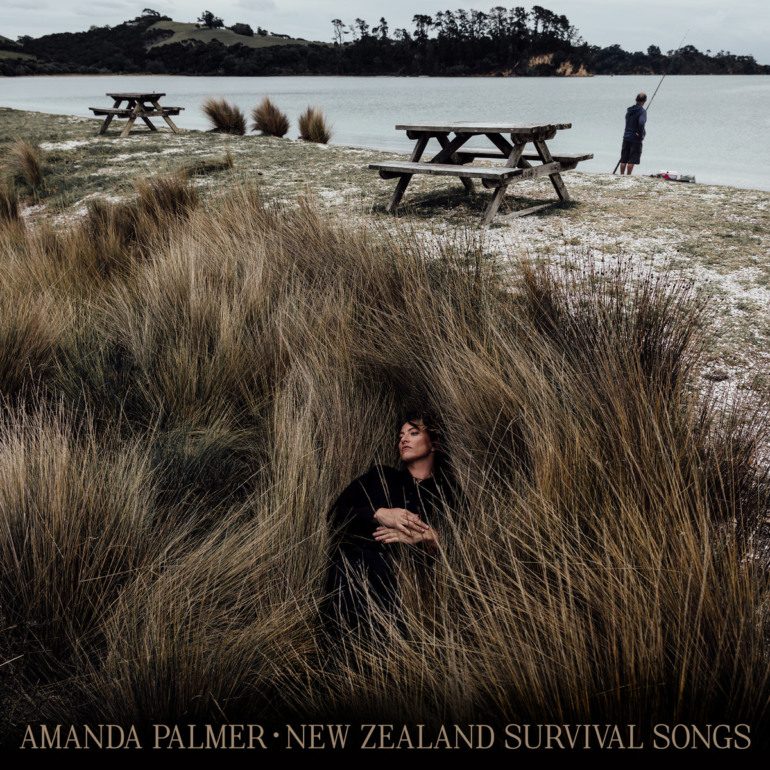

The art of sanity
Musician, author and performance artist Amanda Palmer has recently released her EP New Zealand Survival Songs. This EP is a collection of Palmer’s performances that took place during her two year stay in Aotearoa, New Zealand during the pandemic. Consisting of five pieces, Palmer’s tracklist delves into the impacts of COVID-19, her relationship with New Zealand and the ways in which humans try to regain control during puzzling times.
The first track “The Man Who Ate Too Much” starts with piano and emotionally charged vocals. Eventually strings sneak in, and during the chorus cymbals are added as bass runs stealthily in the background. The irregularities and sudden sharp turns of the instrumentation, paired with theatrical vocal stylings, point towards cabaret influences. Palmer’s raw vocals present vivid imagery that detail little moments such as “Kaya brought Izzy’s old coat and it fits like a glove / And Aiden put Ash on his back when we went for a walk.” These lyrics present the message that during difficult times it is important to celebrate mundanity, and seemingly small moments may be ones people remember forever— in Palmer’s case, especially in the context of parenting. During this part, piano accompanied by whining strings further adds to the song’s theatrics. The pace picks up around the halfway point with a consistent drum beat and an intense ascending vocal performance. But the instrumentation returns to its original state with piano, occasional sprinklings of cymbals and string until the song concludes with rain and whooshing water.
“The Ballad of the New York Times” is the first piece on the EP that was clearly recorded live. Palmer’s serious, idiosyncratic and at times humorous lyrics come back into play, which may cause listeners to compare her to Bo Burnham. Along with this, her voice is a bit similar to P!nk’s in that they both approach lyrics with the same type of intensity. The piano at the beginning of the track starts off fast, then slows down as soon as the lyrics begin. Palmer details her domestic escapades, such as her escorting ants away from expensive Canadian syrup she’d sometimes forget “to put the lid” back on to, which at times lead her to “kill them all with a paper towel.” Immediately after, the audience starts laughing before the piece pivots in tone when Palmer sings “I don’t understand which part of me is kind.” The piano dynamics throughout the piece are impressive in that they match the heaviness that comes along with constantly being exposed to the news thanks to the internet. She lists “Justine’s mom just died of Covid / …And look, a lot of people are vaccinated / And look, a lot of people are lying on Facebook.” “The Ballad of the New York Times” is lyrically dense and may be helpful for those who find that “headlines” often “hurt” their minds, just as they do Palmer’s.
Right away guitar and vocals grace the ears of listeners in “Little Island.” Throughout the song, but especially during the chorus, there are chill-inducing harmonies; specifically on the lyrics “Oh I owe you little island / Little island bigger than my mind.” However, the harmonies are not the only aspects that stick out. There are also lyrics that are seemingly simple, yet have the potential to hit harder depending on who’s listening. One of those being “Some of us are proud of what we brought here / Some of us are proud of what we left behind.” Piano jumping in during the chorus makes the song even more emotional. Then, soaring vocals fill the space until the song closes. The EP concludes with “Two Prophetic & Haunting New Zealand Songs Played Live on Ukulele,” which Palmer personally calls “the New Zealand trilogy.” The track begins with her talking about coincidences that have occurred between her and the country. This final track spans a myriad of tones, ranging from humorous to lewd to solemn. One second she sings “My Period is six days late / And my pubic hair is turning gray,” the next second “I hope I haven’t grossed you out / But that’s what you get when you ask me to write / A song about your country in 20 minutes,” then “There are racists and violence.” This concluding piece reminds listeners that balancing keeping up to date with humor can make all the difference during unprecedented times.
Palmer’s humor and wit shine in New Zealand Survival Songs. Considering the EP’s lyrical density, everybody can find something they’ll relate to regardless of who they are.

